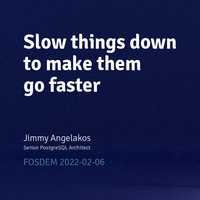Slow things down to make them go faster
- Track: PostgreSQL devroom
- Room: D.postgresql
- Day: Sunday
- Start: 16:00
- End: 17:00
- Video with Q&A: D.postgresql
- Video only: D.postgresql
- Chat: Join the conversation!

It's easy to get misled into overconfidence based on the performance of powerful servers, given today's monster core counts and RAM sizes. However, the reality of high concurrency usage is often disappointing, with less throughput than one would expect. Because of its internals and its multi-process architecture, PostgreSQL is very particular about how it likes to deal with high concurrency and in some cases it can slow down to the point where it looks like it's not performing as it should. In this talk we'll take a look at potential pitfalls when you throw a lot of work at your database. Specifically, very high concurrency and resource contention can cause problems with lock waits in Postgres. Very high transaction rates can also cause problems of a different nature. Finally, we will be looking at ways to mitigate these by examining our queries and connection parameters, leveraging connection pooling and replication, or adapting the workload.
Topics:
1. Understand what we mean by high concurrency.
2. Understand ACID & MVCC in Postgres.
3. Understand how high concurrency affects Postgres performance.
4. Understand how locks/latches affect Postgres performance.
5. Understand how high transaction rates can affect Postgres.
6. Mitigation strategies for high concurrency scenarios.
Speakers
| Jimmy Angelakos |